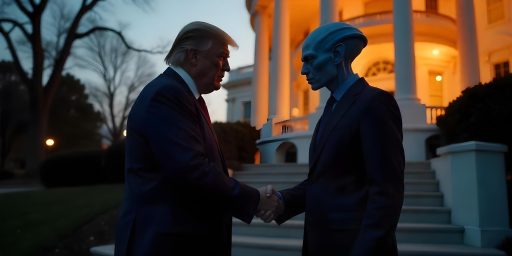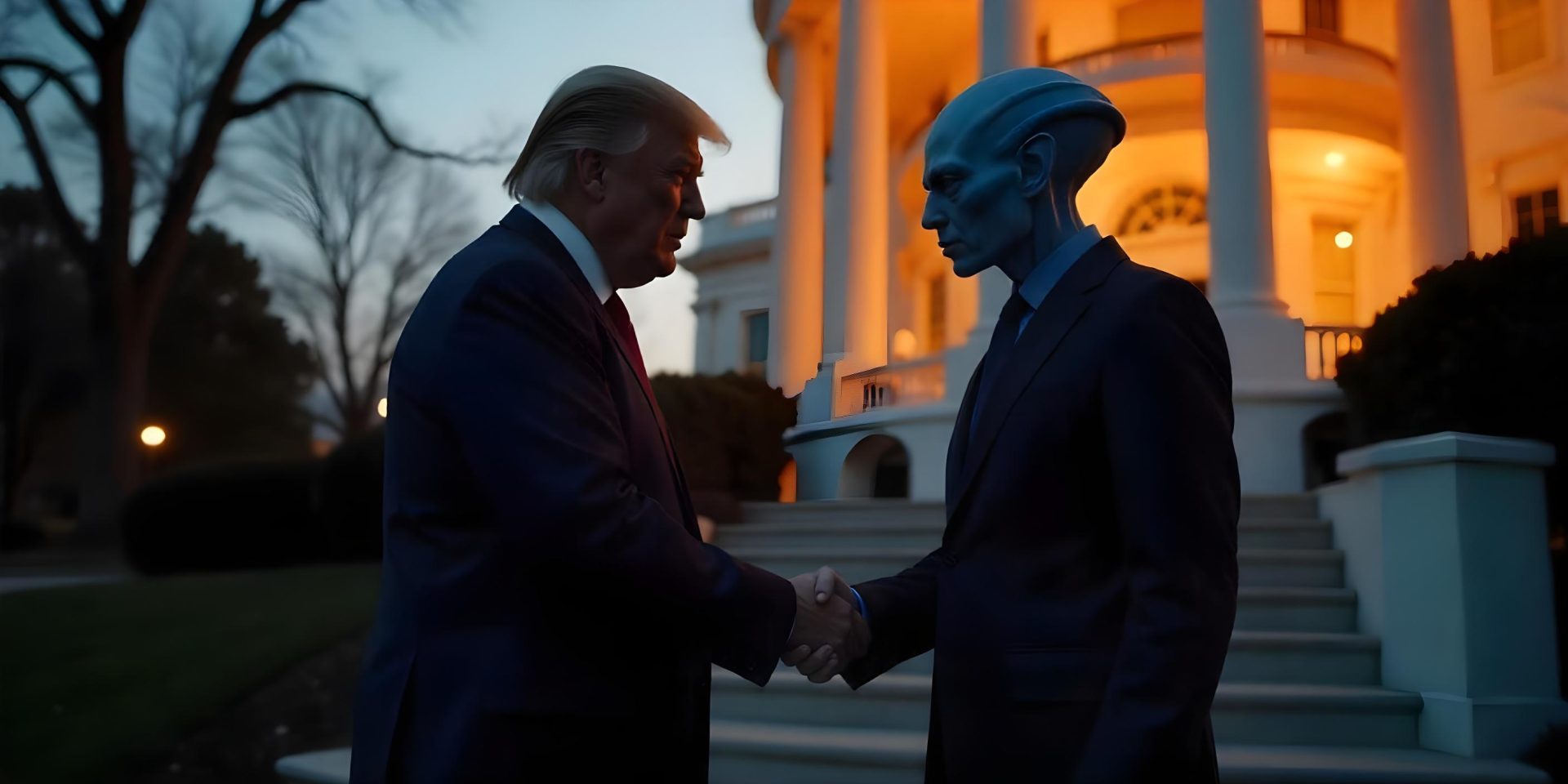“Alien disclosure is like that unopened letter from a friend. It could be a secret worth knowing—or it might just be a grocery list.” — JJ Steelman
Donald Trump isn’t a name you’d typically associate with little green men or shiny spacecraft (although the shiny part tracks). Yet during and after his presidency, the 45th president hinted at knowledge of UFOs and extraterrestrial life—enough to send conspiracy theorists into hyperdrive and UFOlogists into overdrive. So, what’s the real story here? Did Trump brush elbows with the Galactic Federation, or is this another case of cosmic misdirection?
Let’s peel back the layers, because this tale is about more than aliens—it’s about secrecy, science, and maybe a splash of sensationalism.
Roswell Revisited: Trump’s Cryptic Comments
Let’s start with what we know for sure: Donald Trump has a flair for the dramatic. In a 2020 Father’s Day interview with his son, Donald Trump Jr., the younger Trump took the opportunity to ask his dad about one of America’s longest-running mysteries: the Roswell incident.
Trump’s reply was as maddening as it was intriguing:
“I won’t talk to you about what I know about it, but it’s very interesting.”
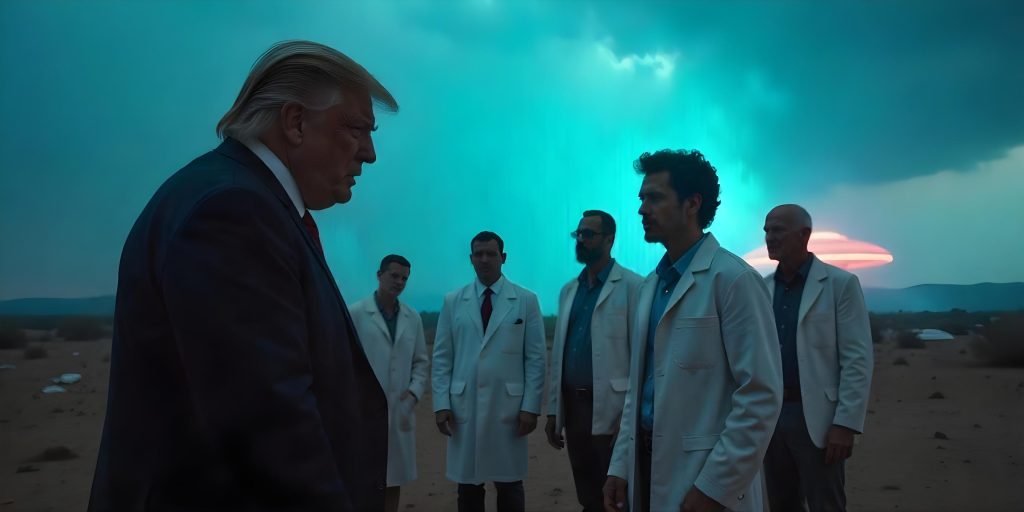
This wasn’t just a soundbite—it was rocket fuel for speculation. Was he sitting on declassified Roswell documents that could change the game? Was this a calculated move to deflect, or did Trump genuinely know something earth-shaking (or galaxy-shaking)? (Newsweek)
The Galactic Federation Claim: Beam Me Up, Eshed
As if 2020 wasn’t weird enough, Haim Eshed, a former Israeli space security chief, stepped into the UFO conversation with a revelation straight out of Star Trek. Eshed claimed not only that the U.S. government had been in contact with aliens but that these extraterrestrial beings were part of a “Galactic Federation.”
Even juicier? According to Eshed, Trump was allegedly on the verge of revealing this cosmic secret but was advised to hold back. The reasoning? Humanity wasn’t “ready” for the news. Sure, 2020 had already given us a pandemic, murder hornets, and Tiger King—what’s a little alien disclosure on top of that?
Eshed’s claims gained media traction worldwide, with some calling them credible and others dismissing them as the ramblings of a retired official craving his 15 minutes. Still, the timing of these allegations—right as UFO discussions were re-entering mainstream discourse—left people wondering. (The Guardian)
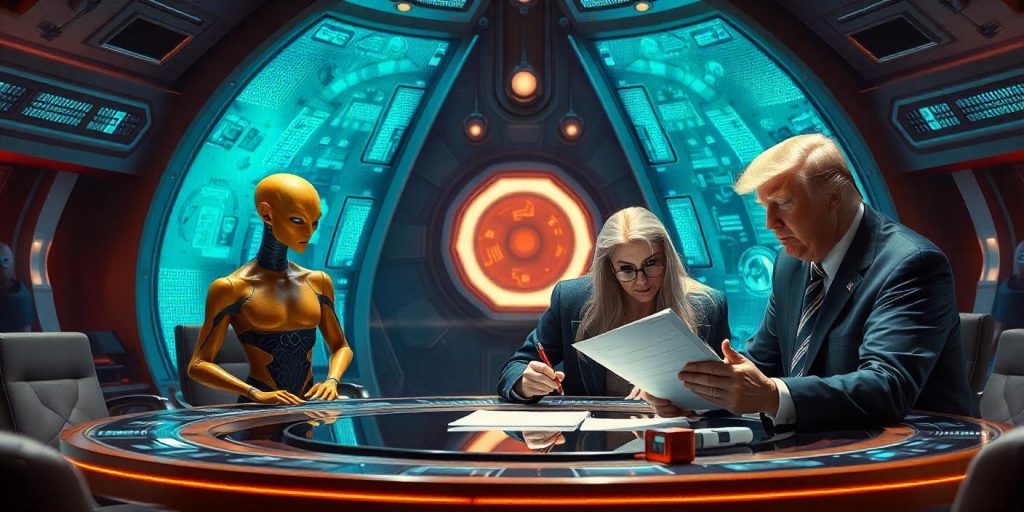
Trump and the UFO Files: Declassification Drama
Beyond Roswell and the Galactic Federation, Trump did take steps that nudged UFO disclosure closer to reality. In 2020, he signed a massive spending bill that included a surprising little clause: intelligence agencies had 180 days to release a report on “Unidentified Aerial Phenomena” (UAPs).
That report landed in June 2021 and brought some startling admissions:
- 144 UAP sightings were documented by U.S. military personnel.
- 143 of those remained unexplained.
The report didn’t confirm alien life, but it did officially acknowledge that UAPs were real, advanced, and worth investigating. It marked a significant shift in how the government handles UFO discussions—from conspiracy theory to credible concern. (NY Times)
And yet, Trump, ever the showman, has hinted multiple times post-presidency that there’s more to come. In late 2024, reports surfaced that he might release additional top-secret UFO files. Will they contain definitive proof of extraterrestrial life, or are we gearing up for another round of blurry photos and vague statements? Time will tell. (Radar)
The Pentagon: Playing Both Sides?
While Trump’s soundbites kept UFO speculation alive, the Pentagon quietly went about its business of redefining the official stance on UFOs.
In 2020, the Pentagon formally launched the Unidentified Aerial Phenomena Task Force (UAPTF), tasked with investigating military encounters with unidentified objects. The results of their work culminated in a series of public briefings and reports, most of which boiled down to this:
- UAPs are real.
- They’re advanced.
- We don’t know what they are.
This might sound underwhelming, but it’s a far cry from the outright denial the government maintained for decades. Is the Pentagon setting the stage for gradual disclosure—or simply buying time? (Source)
The November 13th Congressional Hearing: A New Chapter
Fast forward to November 13, 2024. The U.S. Congress held a hearing titled “Unidentified Anomalous Phenomena: Exposing the Truth.” This wasn’t just another routine meeting; it was a significant step toward transparency on the UFO front.
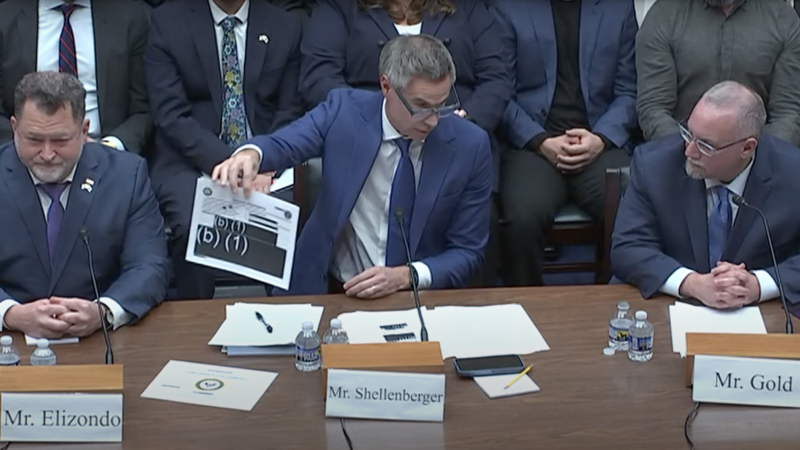
Key takeaways from the hearing:
- Witness Testimonies: Experts, including retired U.S. Navy Rear Adm. Tim Gallaudet and former Department of Defense official Luis Elizondo, testified about encounters with UAPs exhibiting advanced capabilities.
- Government Transparency: Lawmakers criticized the government’s culture of obfuscation, urging it to disclose information about UAP sightings, which potentially pose threats to military security.
- Public Interest: The hearing underscored the growing public demand for clarity on UAPs and potential threats they may pose.
This hearing marked a pivotal moment in the ongoing discourse about UFOs, signaling a shift from secrecy to a more open dialogue.
Why Is UFO Disclosure Such a Hot Topic Now?
The conversation around UFOs isn’t just about Trump or the Pentagon. It’s a cultural phenomenon fueled by timing, technology, and trust issues.
- Cultural Curiosity
UFOs have been a part of pop culture for decades, but there’s been a recent resurgence in interest thanks to documentaries (The Phenomenon), high-profile whistleblowers, and viral TikToks dissecting military footage of UAPs. - Technological Transparency
Advances in camera technology and radar systems mean more sightings are being captured and analyzed. It’s harder than ever for governments to sweep this stuff under the rug. - Eroding Trust in Institutions
Public skepticism toward government secrecy has grown in recent years. The combination of leaks, whistleblower testimonies, and growing demands for transparency has put UFO disclosure firmly on the table.
The Big Question: What Does Trump Actually Know?
Here’s the rub: despite all his hints and coy remarks, we don’t know if Trump has the goods—or if he’s just riding the wave of public interest.
If he does know the truth, the implications are staggering. Full disclosure could reshape everything from science to religion. On the flip side, releasing vague or inconclusive information could erode trust further and send conspiracy theories spiraling.
What makes this even more compelling is the shifting landscape of transparency. With the Pentagon’s recent acknowledgment of UAPs and the November 13th hearing bringing more government accountability into the spotlight, the pressure is mounting. If Trump has the key to unlocking alien secrets, his timing to share them has never been more critical—or strategic.
Investigative Takeaway: What’s Next?
Whether Donald Trump is the ultimate gatekeeper of alien secrets or just another player in a long-running mystery, one thing is clear: UFO disclosure is gaining momentum, and the public isn’t letting it go.
Expect more revelations, whistleblower testimonies, and (hopefully) fewer blurry UFO photos. The November 13th hearing showed that lawmakers and experts alike are taking the topic seriously, with calls for greater transparency echoing louder than ever. The truth might be out there—but so is a stack of government files begging to be declassified.
“When it comes to UFOs, don’t just look to the skies—look to the ones controlling the telescopes.” — JJ Steelman
Disclosure: All images in this blog is created using Ai. Images not made with AI are given proper credits in the caption. Most of the time I use Freepik‘s Ai.
